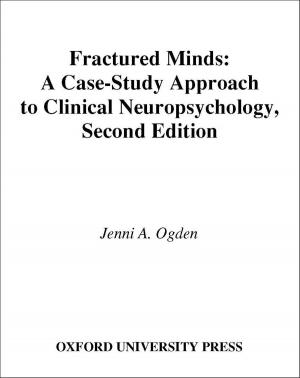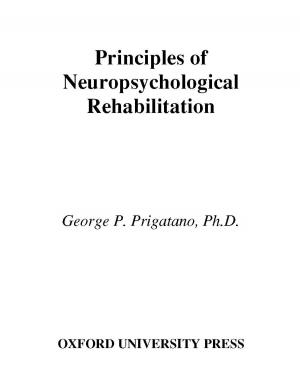Cognitive Enhancement in CNS Disorders and Beyond
Nonfiction, Health & Well Being, Medical, Specialties, Psychiatry| Author: | ISBN: | 9780190214425 | |
| Publisher: | Oxford University Press | Publication: | October 31, 2017 |
| Imprint: | Oxford University Press | Language: | English |
| Author: | |
| ISBN: | 9780190214425 |
| Publisher: | Oxford University Press |
| Publication: | October 31, 2017 |
| Imprint: | Oxford University Press |
| Language: | English |
Cognitive Enhancement in CNS Disorders and Beyond compiles a series of educational and thought-provoking chapters from the world's leading cognitive and clinical scientists to describe the latest research on cognitive impairments in a host of pathological conditions that affect CNS functioning, what treatments are available for these impairments, and how new treatments are being tested. This volume will benefit any investigators in cognitive science and clinical research, but is also accessible to non-experts. It advances the field toward the availability of cognitive enhancing drugs and devices that will benefit those who need them most and others who may feel that these techniques can help them to thrive. There has never been a time that we knew more about cognition and never a time when cognition was more important to the functioning of human beings than right now. Psychological science and cognitive neuroscience have become the most popular endeavor of students world wide, is the focus of attention of our greatest scientific accomplishments and the emphasis of many publications in the mainstream media. Since humans depend on cognitive abilities for survival, quality of life, and productivity, improving it has never been more important. Those with impairments in key aspects of cognition suffer dearly, as they are unable to obtain and retain information, unable to make sound decisions based upon the information at hand, and unable to plan future activities. The availability of pharmacological and behavioral interventions that can improve cognitive abilities and provide impaired individuals with the social, occupational and functional quality of life that the rest of us enjoy has potential far-reaching implications. Such interventions can also benefit those who want to boost current cognitive abilities to higher levels, perhaps as a means to hone skills in providing products for others or to gain an edge on competition. There has never been a book devoted solely to describing the latest cognitive science and neuroscience on the methods for enhancing cognition in healthy and unhealthy humans. Cognitive Enhancement in CNS Disorders and Beyond accomplishes exactly that in a straightforward and accessible manner.
Cognitive Enhancement in CNS Disorders and Beyond compiles a series of educational and thought-provoking chapters from the world's leading cognitive and clinical scientists to describe the latest research on cognitive impairments in a host of pathological conditions that affect CNS functioning, what treatments are available for these impairments, and how new treatments are being tested. This volume will benefit any investigators in cognitive science and clinical research, but is also accessible to non-experts. It advances the field toward the availability of cognitive enhancing drugs and devices that will benefit those who need them most and others who may feel that these techniques can help them to thrive. There has never been a time that we knew more about cognition and never a time when cognition was more important to the functioning of human beings than right now. Psychological science and cognitive neuroscience have become the most popular endeavor of students world wide, is the focus of attention of our greatest scientific accomplishments and the emphasis of many publications in the mainstream media. Since humans depend on cognitive abilities for survival, quality of life, and productivity, improving it has never been more important. Those with impairments in key aspects of cognition suffer dearly, as they are unable to obtain and retain information, unable to make sound decisions based upon the information at hand, and unable to plan future activities. The availability of pharmacological and behavioral interventions that can improve cognitive abilities and provide impaired individuals with the social, occupational and functional quality of life that the rest of us enjoy has potential far-reaching implications. Such interventions can also benefit those who want to boost current cognitive abilities to higher levels, perhaps as a means to hone skills in providing products for others or to gain an edge on competition. There has never been a book devoted solely to describing the latest cognitive science and neuroscience on the methods for enhancing cognition in healthy and unhealthy humans. Cognitive Enhancement in CNS Disorders and Beyond accomplishes exactly that in a straightforward and accessible manner.















